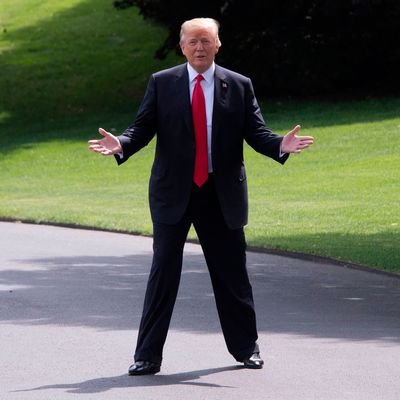
President Trump’s lawyers believe that he is above the law when it comes to obstruction of justice, according to a bombshell new report in the New York Times. In a leaked 20-page letter, they have told Special Counsel Robert Mueller that Trump cannot be charged with the crime, asserting that his presidential power gives him unchecked authority over the Justice Department. The January memo, the Times reports, “contends that the president cannot illegally obstruct any aspect of the investigation into Russia’s election meddling because the Constitution empowers him to, ‘if he wished, terminate the inquiry, or even exercise his power to pardon.’ ”
The letter, which was written by Trump lawyers John M. Dowd and Jay A. Sekulow, is reportedly part of a legal campaign to prevent Trump from having to answer Mueller’s questions, or from being compelled to testify, out of fear that Trump would expose himself to another crime — lying to federal investigators — which he could be impeached for.
The lawyers also made the broad claim that “every action that the president took [amid the Russia investigation] was taken with full constitutional authority pursuant to Article II of the United States Constitution,” and thus, “these actions cannot constitute obstruction, whether viewed separately or even as a totality.”
In other words, they told the special counsel that they are prepared to test the constitutional limits of Trump’s presidential powers:
Mr. Mueller has told the president’s lawyers that he needs to talk to their client to determine whether he had criminal intent to obstruct the investigation into his associates’ possible links to Russia’s election interference. If Mr. Trump refuses to be questioned, Mr. Mueller will have to weigh their arguments while deciding whether to press ahead with a historic grand jury subpoena.
According to legal experts consulted by the Times, “it is not clear whether statutes criminalizing obstruction of justice apply to the president and amount to another legal limit on how he may wield his powers.”
Trump’s lawyers insist that “Of course, the president of the United States is not above the law, but just as obvious and equally as true is the fact that the president should not be subjected to strained readings and forced applications of clearly irrelevant statutes.”
But it’s not clear that Trump’s lawyers understand those statutes, or the case, as well as they purport to.
First, the letter oddly claims that, when Trump allegedly asked former FBI director James Comey to end the investigation into former national security adviser Michael Flynn, the president could not been trying to obstruct justice, since he did not know Flynn was under investigation in the first place. Except, you know, there’s a tweet:
Trump’s lawyers also insist that FBI investigations don’t count as the kind of “proceedings” which can be obstructed — but there is a problem there too:
[T]he lawyers based those arguments by citing an outdated statute, without mentioning that Congress passed a broader law in 2002 that makes it a crime to obstruct proceedings that have not yet started.
Samuel W. Buell, a Duke Law School professor and white-collar criminal law specialist who was a lead prosecutor for the Justice Department’s Enron task force, said the real issue was whether Mr. Trump obstructed a potential grand jury investigation or trial — which do count as proceedings — even if the F.B.I. investigation had not yet developed into one of those. He called it inexplicable why the president’s legal team was making arguments that were focused on the wrong obstruction-of-justice statute.
Trump tweeted about the letter ahead of the impending report, repeating the big lie that it was the Democrats who were colluding with Russia ahead of the 2016 election, and asking, “When will this very expensive Witch Hunt Hoax ever end?”
Trump’s tweet also illustrates the other central strategy being deployed by the president and his lawyers and allies, which to discredit the investigation in the eyes of the public. That game plan, Trump lawyer Rudy Giuliani acknowledged last weekend, is meant to build political support under the assumption that impeachment may be inevitable. These attacks have escalated as of late, at the same time that Giuliani and Trump’s other lawyers are trying to negotiate with, and pressure, Mueller over Trump’s possible testimony. It also suggests that their efforts to convince Mueller he cannot legally reach the president, at least when it comes to obstruction charges, have not been successful.






























